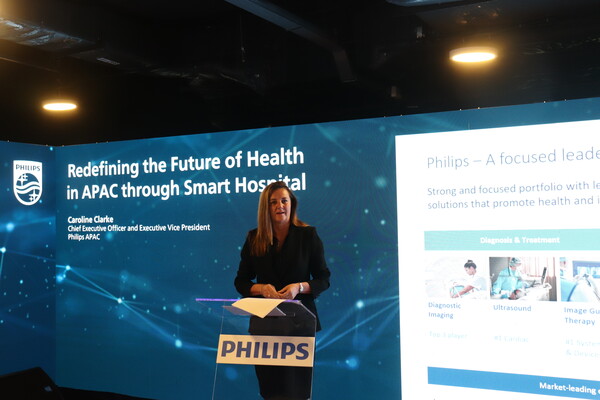SINGAPORE -- By Lee Han-soo/Korea Biomedical Review correspondent -- In its Future Health Index (FHI) 2023 report, Philips has unveiled that a new healthcare delivery model is taking shape in the Asia Pacific (APAC) region. The report surveyed nearly 3,000 physicians, hospital directors, and nurses across 14 countries, including Australia, Indonesia, and Singapore. However, the survey did not include Korea.

The report, titled "Taking Healthcare Everywhere," sheds light on the increasingly decentralized model of healthcare being adopted across APAC.
"With data and technology at its core, this model prioritizes bringing care to patients in their homes and communities, enhancing both efficiency and environmental sustainability," Philips APAC CEO and Executive Vice President Caroline Clarke said.
According to Clarke, this shift toward distributed care delivery enables healthcare to be provided anytime and anywhere, effectively positioning patients at the forefront of the care model.
"It is our purpose to improve people's health and well-being through meaningful innovation," Clarke said. "We aim to improve the lives of 2.5 billion people annually by 2030."
Clarke explained that one of the core solutions in making such goals come true is using the distributed care delivery approach as a key solution in regions grappling with significant financial constraints and doctor shortages.
The FHI report also showed that 66 percent of APAC healthcare leaders and young healthcare professionals thought they were adequately prepared to implement these new models.
According to Philips, healthcare leaders are senior executive decision-makers and influencers working in a hospital, medical practice, imaging center/office-based lab, ambulatory center, or urgent care facility.
Younger healthcare professionals are defined as those aged between 18 and 40 who have completed their first medical and nursing degrees and are working as healthcare professionals in a clinician role.
"They anticipate the new models of care will allow increased patient compliance and treatment adherence, improved patient education and awareness and understanding, and increased work efficiency for physicians as some of the top benefits," Clarke said.
APAC healthcare providers showed a more positive view of the benefits of the decentralized model compared to global healthcare providers, the FHI report showed.
The survey also indicated a potential morale boost among healthcare workers, with a majority expecting better work-life balance (58 percent) and increased job satisfaction (56 percent) as a result of these new care delivery models.
Philips aims to accelerate new care model adoption
During the presentation, Clarke also explained that the adoption of the new care delivery models is fueled by higher investments in digital health technologies and artificial intelligence (AI), as well as expanding virtual care, also known as telemedicine, across the healthcare ecosystem.
"A total of 74 percent of hospital leaders plan to invest in AI in the next three years, with digital health records being the top investment priority (48 percent)," Clarke said.
Emphasizing the importance of data interpretation skills and staff willingness to adopt new technologies, Clarke also highlighted that 44 percent of younger healthcare professionals believe they require improved training on new technologies to enhance patient care.
"In response to the global issue of healthcare staff shortages, 67 percent of APAC hospital leaders are also turning to digital health technology, which is much higher than the global average of 56 percent," the APAC head said. "They are primarily focusing on cloud-based technology for information access, technology solutions for out-of-hospital settings, and workflow technology."
While the healthcare industry in the APAC region remains strongly committed to sustainability, there are hurdles to overcome.
These include difficulties in accessing suitable technology (43 percent), an absence of standardization across the sector (37 percent), and a lack of enthusiasm among staff members (32 percent).
To address these obstacles, healthcare leaders in the region propose creating compelling business cases for the initiation of sustainable practices (42 percent) and sharing effective examples of these practices (38 percent).
Additionally, the leaders advocate for the engagement of external consultants for the development and support of sustainable programs and the hiring of staff with specialized skills (35 percent).
In response to these findings, Clarke expressed enthusiasm about the future and envisioned a digitally-advanced healthcare ecosystem that balances human-centric care with sustainability.
"As hospital leaders and younger healthcare professionals in APAC share our clear vision for the future of care delivery, we are eagerly anticipating the chance to partner with such doctors in spearheading patient care for the next decade," Clarke said. "Such partnerships are imperative to unleash the full potential of digital transformation for a new era of smart, sustainable personalized care within and beyond the hospital walls."

